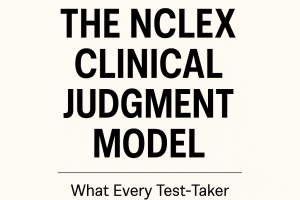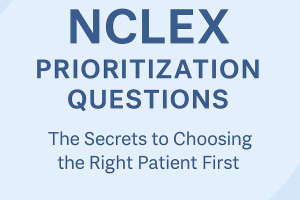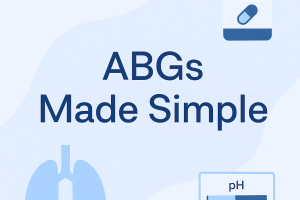HIGH- YIELD CARDIAC MEDICATIONS FOR NCLEX

Introduction
Cardiac medications are a crucial component of the NCLEX exam. As future nurses, understanding how to administer these drugs safely and effectively is key to ensuring optimal patient outcomes. This blog post will cover the most common high-yield cardiac medications, their uses, side effects, and nursing considerations, helping you better prepare for the NCLEX.
1. ACE Inhibitors (Angiotensin-Converting Enzyme Inhibitors)
Common Medications:
– Lisinopril
– Enalapril
– Captopril
Mechanism of Action:
ACE inhibitors block the conversion of angiotensin I to angiotensin II, resulting in vasodilation and reduced blood pressure. These medications are primarily used to treat hypertension and heart failure.
Nursing Considerations:
– Monitor blood pressure regularly.
– Educate patients about the risk of a persistent dry cough, a common side effect.
– Watch for signs of hyperkalemia (increased potassium levels).
– Assess for angioedema, a rare but serious side effect.
2. Beta Blockers
Common Medications:
– Metoprolol
– Atenolol
– Propranolol
Mechanism of Action:
Beta blockers reduce the heart rate and decrease the workload on the heart by blocking beta-adrenergic receptors. These medications are often used in the treatment of hypertension, angina, and heart failure.
Nursing Considerations:
– Monitor heart rate and blood pressure closely.
– Hold the medication if the heart rate drops below 60 beats per minute or if the blood pressure is too low.
– Educate patients about potential side effects, such as fatigue and dizziness.
– Use caution in patients with asthma or chronic obstructive pulmonary disease (COPD), as beta blockers can cause bronchoconstriction.
3. Calcium Channel Blockers
Common Medications:
– Amlodipine
– Diltiazem
– Verapamil
Mechanism of Action:
Calcium channel blockers relax blood vessels and decrease the heart’s workload by inhibiting calcium ions from entering the heart and arterial walls. These medications are used to treat hypertension, angina, and certain arrhythmias.
Nursing Considerations:
– Monitor blood pressure and heart rate.
– Educate patients about the risk of peripheral edema (swelling in the legs or feet).
– Caution patients to avoid grapefruit juice, which can increase drug levels and lead to toxicity.
– Assess for signs of bradycardia (slow heart rate) and hypotension.
4. Diuretics
Common Medications:
– Furosemide (Loop diuretic)
– Hydrochlorothiazide (Thiazide diuretic)
– Spironolactone (Potassium-sparing diuretic)
Mechanism of Action:
Diuretics help the body eliminate excess fluid and sodium through the urine. They are commonly used in the management of hypertension, heart failure, and edema.
– Monitor electrolyte levels, especially potassium, as diuretics can cause imbalances.
Nursing Considerations:
– Educate patients about the importance of staying hydrated and maintaining a balanced diet.
– Monitor for signs of dehydration, such as dry mouth or decreased urine output.
– Assess for orthostatic hypotension, a sudden drop in blood pressure when standing up.
5. Anticoagulants
Common Medications:
– Warfarin
– Heparin
– Enoxaparin
Mechanism of Action:
Anticoagulants prevent blood clots from forming or growing larger. They are commonly used in patients with atrial fibrillation, deep vein thrombosis (DVT), and pulmonary embolism.
Nursing Considerations:
– Monitor lab values such as PT/INR (for warfarin) and aPTT (for heparin) to ensure therapeutic levels.
– Educate patients to avoid foods high in vitamin K, which can reduce the effectiveness of warfarin.
– Watch for signs of bleeding, such as bruising, nosebleeds, or blood in the urine or stool.
– Provide patients with information on bleeding precautions, such as using a soft toothbrush and avoiding activities that could lead to injury.
Sample NCLEX Questions:
1. A nurse is administering morning medications. Which patient should receive their beta blocker first?
A. A patient with a heart rate of 50 beats per minute
B. A patient with a blood pressure of 100/60 mm Hg
C. A patient with a heart rate of 80 beats per minute and a history of atrial fibrillation
D. A patient who is experiencing chest pain due to angina
Answer:
C. The patient with a heart rate of 80 beats per minute and a history of atrial fibrillation is stable to receive the beta blocker. A heart rate below 60 beats per minute or low blood pressure may indicate withholding the medication.
2. A nurse is providing education to a patient who has been prescribed warfarin. Which of the following statements by the patient indicates a need for further teaching?
A. “I will have regular blood tests to check my INR levels.”
B. “I will avoid eating too much spinach and other foods high in vitamin K.”
C. “I can take aspirin for headaches while on warfarin.”
D. “I will report any unusual bruising or bleeding to my doctor.”
Answer:
C. The patient should not take aspirin while on warfarin due to the increased risk of bleeding. Further teaching is needed to clarify this.
3. A patient is receiving furosemide for the treatment of heart failure. Which of the following findings would require immediate action by the nurse?
A. Potassium level of 3.2 mEq/L
B. Blood pressure of 110/70 mm Hg
C. Reports of dizziness when standing up
D. Swelling in the lower extremities
Answer:
A. A potassium level of 3.2 mEq/L is below normal and could indicate hypokalemia, a common side effect of loop diuretics like furosemide, requiring immediate action.
Conclusion
Understanding high-yield cardiac medications is vital for passing the NCLEX and ensuring patient safety in real-world nursing practice. By familiarizing yourself with these key drugs, their mechanisms, and the associated nursing considerations, you can confidently approach cardiac-related questions on the NCLEX. Remember, regular practice with NCLEX-style questions will help sharpen your critical thinking and decision-making skills.






